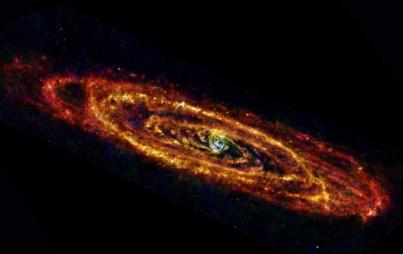
In theory, Noah and Cosmos are nothing alike. One is a multimillion-dollar action film based on one of the most well-known and beloved biblical narratives in history. The other is a geeky science show that delves into the inner-workings of the universe.
Yet these two disparate productions share at least one big thing: fired-up backlash from religious fundamentalists.
Noah has sparked ire for its very loose interpretation of the Bible. Apparently, turning scripture into an action-packed 3-D extravaganza requires some, er, artistic liberties. Plus, its director, Darren Aronofsky, is an out atheist, which as you can imagine is not sitting well with the devout crowd. Here's how a writer for Creationist Today put it when referring to Aronofksy:
You have to wonder, is this atheist just seeing if he can make fun of the Bible and get Christians to pay for it?
Ouch! Some are even mad about the very shape of the ark, proving that you really, truly can't please 'em all.
As for Cosmos, it too has fundamentalists up in arms, primarily for overlooking creationism in its assessment of the origin of the universe. It has also boldly—and rather shockingly, considering it airs on Fox—not shied away from criticizing religious dogma outright. An extended animated segment in the first show focused on Giordano Bruno, who was persecuted by the church for sharing his theory that Earth wasn't the center of the universe. The show reveals the torture devices used against him, and even makes the pope look like Jafar in a papal hat—not the kind of stuff religious folks are keen to embrace.
The question is . . . is the backlash justified? Well, yes and no. While it'd be easy to dismiss the rantings as those of far-right nutjobs, I'd argue that the Noah outcry is actually justified, where the Cosmos ire is not.
Here's why: Noah cravenly seems to want it both ways. It's taken a very popular biblical passage that it knows resonates with religious people around the world and blatantly marketed it as a celebration of the scripture. Then (wink wink) it's taken tons of sly liberties to sell tickets to the non-devout as well.
Producers even acquiesced to the demands of fundamentalists by adding this ridiculous, pandering disclaimer to the film's website, ads and trailer:
The film is inspired by the story of Noah. While artistic license has been taken, we believe that this film is true to the essence, values and integrity of a story that is a cornerstone of faith for millions of people worldwide. The biblical story can be found in the book of Genesis.
If the movie wants to change up or challenge Biblical passages, it should absolutely be able to do that. If it wants to celebrate the Bible and market itself as such, fine. But trying to be subversive while appealing to the pocketbooks of the devout is annoyingly duplicitous.
Cosmos, conversely, is openly dedicated to exploring science, which has legitimately come up against dangerous religious dogma over the course of history. It hasn't ever marketed itself as anything other than what it is, or tried to make itself different to lure more viewers. Moreover, it actually celebrates religion in an authentic, thoughtful way. We learn that Bruno, for example, felt connected to something bigger and greater that God created and others didn't understand. He was challenged by the institution of religion, but was actually a faithful man who saw his beliefs as existing in harmony with scientific curiosity.
This is a profound idea that that at once celebrates and challenges our notions of faith, making Cosmos a production that the religious and non-religious alike should celebrate. The same, alas, can't be said for Noah, a blood-soaked action flick that turns scripture into a shameless, money-grabbing plot gimmick. In Noah v. Cosmos, the nerd show wins.
Image: Wikimedia Commons






